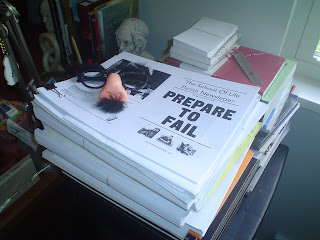The Dangerous Paths of the Idle Mind: The Soundtrack of "My" War
Away from courses, teaching, and committees for the summer and this is the first thing I can come up to write here? It might end up being one sad, unproductive summer if I don't watch out.
A few nights ago, engaged in hand-to-hand combat with a terrible bout of insomnia, I broke down and turned my television on. Some channel was playing the movie "Jarhead," a movie (and a book) I had refused to read or watch for some time. The book I tackled some years ago; the movie I just swallowed a couple of nights ago and I still feel like vomiting. At any rate, this is the story of how I developed a ridiculous impulse to write an entry on this blog dealing with Operation Desert Shield/Storm and the music soundtrack of the war itself.
There are many reasons why I found the book attractive when it first came out in 2003, some more obvious than others. Regardless of my personal experiences in 1990-1991, the fact that the book was published in the months leading to the controversial Iraq invasion was enough to stimulate my overriding impulses to keep my budget that month and I went out and bought a hardcover first edition at the outrageous price of $24.00 which I couldn't afford at the time. It sat on my shelve for a couple of years before I read it. One of the things that bothered me about the book was a criticism shared by most combat veterans from that now seemingly distant conflict. With all my respect to Mr. Swofford, the book was preachy and at times even horribly pedantic. Parts of the books seemed more interesting in proving which Marines fought real combat and which Marines distributed out shit-paper and toothpaste at the supply depot. Michiko Kakutani's statement from "The New York Times" went as far as comparing it to Michael Herr's "Dispatches," which many found insulting and emblematic of how ignorant the media can be about serious matters such as men at war. Again, I was divided on what to think--2003 was not the easiest year for me personally and whatever attention I could give to book criticism was very limited. The common criticism among former Jarheads was that Swofford wanted to sound like a professor of Marine Corps history and insisted in pointing out details about the Corps that were either unimportant or irrelevant to the narrative. I remember that (for whatever the reason) I tried defending the book at the last "India" Co., 3rd Battalion, 6th Marines reunion. It was a futile effort--most of my former brothers in arms had watched the movie, not read the book. For this reason, I was been divided on whether to watch the movie or not, until a few nights ago.
The main objective of this entry is to prove a slightly off comment I watched in the film but cannot remember whether or not it was in the book. Swofford laments the fact that the helicopters flying overhead with loud speakers were playing music from the 1960s, Vietnam music. It's not clear to me now whether it was The Rolling Stones or The Doors, but music from the 60s it was. Swofford's commentary was something to do with the shitty music of the early 1990s, particularly from the duration time of the war itself. I did a little research and found out he was absolutely right--top music lists from the fall of 1990 to the spring of 1991 were full of fluffy, bubble gum popular tunes. But wait... during that time wasn't I listening to Don Henley's "The End of the Innocence" and Tom Petty's "Full Moon Fever" and also the soundtrack from Ken Burn's "The Civil War?" Sure, some of these were released in late 1989, but most radio stations (including the Armed Forced network) were still very actively playing both Don Henley and Tom Petty. Songs like "Free Falling," and "The Heart of the Matter" were not only philosophically insightful but also comforting to a nineteen or twenty-something 3,000 miles from home, missing his girlfriend, sitting on so much sand; Swofford called it "the sweaty arm pit of the world." That was the soundtrack of my war, and there isn't a single time since I've heard any of those songs played on the radio when I don't get pulled back to that confusing war. In the absence of music of real substance, all one had to do was pop in a carefully selected (operative words) cassette and dream on. Peace.
Labels: Anthony Swofford, Jarhead, music soundtrack of the war



